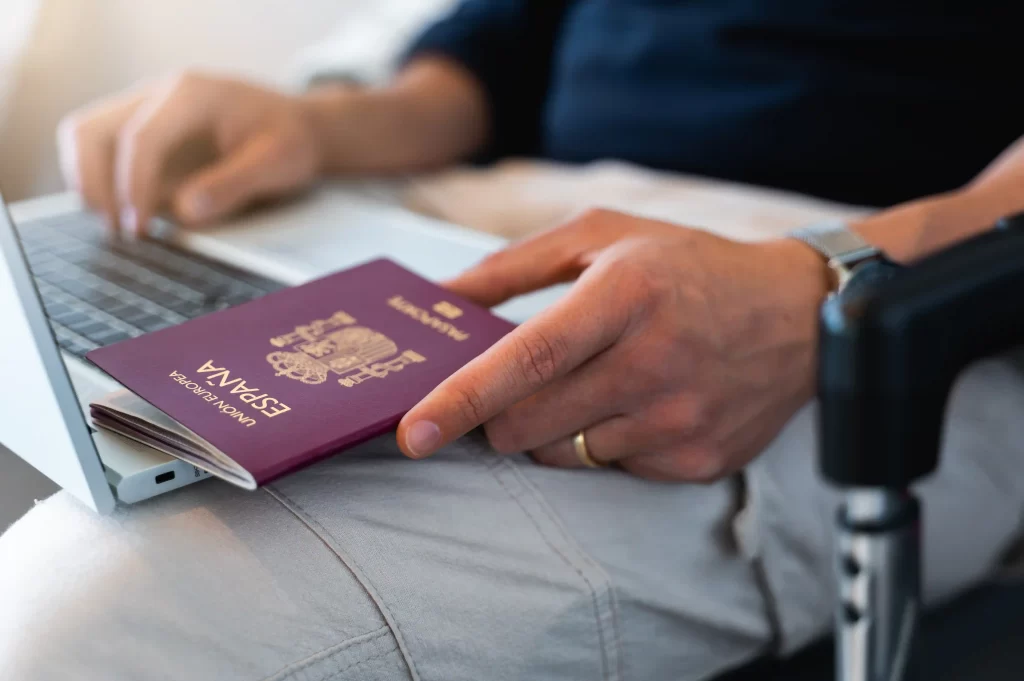Obtaining Spanish citizenship by naturalization is a process that allows foreign nationals to become Spanish citizens after meeting certain residency and legal requirements through visa support. Typically, the standard residency requirement is ten years of legal residence in Spain, during which the applicant must have integrated into Spanish society, which is possible through an apt visa support system. However, there are exceptions: citizens from Latin American countries, Andorra, the Philippines, Equatorial Guinea, and Portugal, and those of Sephardic Jewish descent may apply after just two years of residency, a student visa for Spain too can be considered for this purpose. Refugees can apply after five years, while individuals married to Spanish citizens or born in Spanish territories may be eligible after one year.
Brief overview of Spanish citizenship’s significance
The process of naturalization of Spanish citizenship has evolved significantly over the years, reflecting broader social, political, and economic changes within Spain and the European Union. In the late 20th and early 21st centuries, Spain began to reform its naturalization laws for Spanish citizenship to be more inclusive and reflective of its evolving role in the global community. One major change was the introduction of preferential treatment for citizens from former Spanish colonies through a guided visa support system, allowing them to apply for citizenship after just two years of residency, in recognition of shared cultural and historical ties. Additionally, the process for visa support was streamlined to facilitate integration and accommodate Spain’s growing immigrant population, especially from Latin America, North Africa, and the European Union.
More recent reforms in the visa support system have included the extension of citizenship rights to descendants of Sephardic Jews expelled from Spain during the Inquisition, reflecting a broader acknowledgment of historical wrongs and an effort to reconnect with the diaspora through a friendlier visa support system. The requirements for the naturalization of Spanish citizenship have also been modernized, with a focus on language proficiency, cultural integration, and participation in Spanish society.
These changes have made the naturalization process for Spanish citizenship more accessible and aligned with contemporary values of inclusivity and multiculturalism. As the Spanish Embassy continues to adapt its policies to the realities of a globalized world, its naturalization process reflects a balance between maintaining national identity and embracing the diverse contributions of its new citizens.
Latest ranking positions of Spanish passport according to major passport indexes
Spain consistently ranks near the top of the Henley Passport Index, a global ranking of passports based on the number of destinations their holders under the visa support system can access without a prior visa. As of the latest rankings, Spain is typically positioned within the top five, reflecting the strength of its passport and access to Schengen visas. Spanish passport holders enjoy visa-free or visa-on-arrival access to over 190 countries, making it one of the most powerful passports in the world. This high ranking is a testament to Spain’s robust diplomatic relationships and its membership in the European Union under the Schengen visa regime, which provides Spanish citizens with extensive mobility across Europe and beyond. The strong position of Spain in the Henley Passport Index underscores the significant travel freedom and global opportunities available to its citizens under a robust visa support system.
In Arton Capital’s Passport Index, Spain typically ranks among the top countries, reflecting the strength and global mobility offered by a Spanish passport under its visa support. The Passport Index ranks passports based on their “Global Mobility Score,” which considers the number of countries a passport holder can visit without a visa or with a visa on arrival. Spain consistently features in the upper tier of this index, often in the top 10, thanks to its extensive visa-free or visa-on-arrival access to over 170 countries which include Schengen visa countries. This high ranking highlights the considerable travel freedom enjoyed by Spanish citizens and emphasizes Spain’s strong international standing and diplomatic relations through its visa support outreach.
Number of countries Spanish passport holders can visit without a visa facilitated through the Spanish Embassy
A Spanish passport offers numerous advantages including seamless access to Schengen visa countries, making it a highly desirable travel document under its extending visa support. As a member of the European Union (Schengen visa countries), Spanish passport holders enjoy the freedom to live, work, and study in any of the 27 EU countries without the need for additional visas or permits. Additionally, they benefit from visa-free or visa-on-arrival access to over 190 countries and territories worldwide, including popular education destinations like the United States, Canada, and Australia, the space shared by the student visa for Spain. The passport leading to Spanish citizenship also provides access to robust consular protection through Spain’s extensive diplomatic network. Furthermore, Spain’s strong global reputation ensures that its passport holders under the visa support system face minimal restrictions and can travel with confidence, enjoying a high level of international mobility and security.
How the strength of the passport impacts international travel and mobility under visa support
The powerful country’s passport acts as a strong currency, significantly enhancing international travel and mobility for its holders under its highly efficient visa support system. Just as a robust currency facilitates economic transactions across borders, a highly ranked passport enables seamless access to a wide range of countries without the need for lengthy visa processes facilitated through its dynamic visa support. This ease of travel opens up opportunities for global business, education, and cultural exchange coordinated through the Spanish embassy, allowing citizens to engage with the world more freely and efficiently.
The strength of the passport under its accompanying robust visa support system reflects the diplomatic relationship and global standing of the issuing country, which in turn grants its citizens privileged access to other nations. A powerful passport armed with a robust visa support system not only simplifies travel logistics but also offers a sense of security and confidence to travelers, knowing they can move freely across borders. Moreover, this visa support system coordinated through local Spanish embassies enhances the ability to participate in international markets, attend global conferences, and pursue educational opportunities abroad.
In this way, a powerful passport accompanied by its visa support functions as a key that unlocks global mobility, making it an invaluable asset for citizens who wish to engage with the world on multiple levels. Whether for business, leisure, or personal growth, the advantages of holding a strong passport are profound, providing access to a wider array of possibilities in an increasingly interconnected world under an overarching strong visa support.
Beyond practical advantages, holding a Spanish passport as a token of Spanish citizenship also symbolizes a connection to Spain’s rich cultural heritage and its global influence. Whether for personal growth, professional advancement, or simply the joy of exploration, a Spanish passport testifying the Spanish citizenship truly serves as a gateway to a world of possibilities.
Moreover, a Spanish passport symbolizing Spanish citizenship provides the right to live, work, and study in any of the 27 European Union (EU) member states, as well as in countries within the European Economic Area (EEA) and Switzerland. This access to the EU’s vast economic and cultural landscape through Spanish citizenship enhances career prospects and quality of life, offering opportunities in some of the world’s most vibrant cities.

How the ranking of the Spanish passport has changed over time under its visa support regime
The recognition and prestige of the Spanish passport as a testament to Spanish citizenship have steadily gained ground over the years, reflecting Spain’s growing influence on the global stage and its strong diplomatic ties. Historically, Spain’s passport as proof of Spanish citizenship was highly valued within Europe, but its global reach has expanded significantly under its expanding visa support, particularly in the late 20th and early 21st centuries. This growth is largely due to Spain’s active role in the European Union, its participation in international organizations, and its robust bilateral relationships with countries around the world resulting in its growing possibilities for visa support aligning to the Schengen visa.
As Spain became more integrated into global economic and political networks through its expansive visa support, the Spanish passport began to offer its holders increasingly greater access to countries across different continents. Today, the Spanish passport, truly a reward for Spanish citizenship, ranks among the most powerful in the world, granting visa-free or visa-on-arrival entry to over 190 countries. This remarkable global mobility as a part of Schengen’s visa is a testament to Spain’s successful foreign policy and its commitment to fostering international cooperation.
How the ranking influences travel ease for Spanish citizens under its expansive visa support system
Spain’s high ranking in passport indices is not just a reflection of travel convenience but also of the country’s global influence and integration into international frameworks under its growing visa support system. As such, holding a Spanish passport opens doors not only to travel but also to a vast array of cultural, social, and economic opportunities, making it one of the most desirable passports in the world, hence, so many are keen on Spanish citizenship even if it is obtained through the route of student visa for Spain.
The increased recognition of the Spanish passport not only enhances the travel freedoms of its citizens under its visa support system but also symbolizes Spain’s respected status as a major global player. Whether for tourism, business, or education, the Spanish passport opens doors to a world of opportunities under the remit of its visa support, making it a highly coveted document in the realm of international mobility.
Summary of key points under Spanish visa support
To obtain Spanish citizenship by naturalization, applicants must demonstrate good conduct, financial stability, and integration into Spanish society. This includes passing language and cultural tests, and showing respect for Spanish laws. The process also requires renouncing the applicant’s original nationality unless they are from a country where dual citizenship agreements exist with Spain as a part of their passport or visa support.
A Spanish passport is indeed a window to the larger world, offering its holders unparalleled access to opportunities and experiences across the globe, thanks to the visa support it provides. This ease of mobility opens doors to diverse cultures, educational opportunities, and global business ventures, allowing Spanish citizens to explore and engage with the world more freely under its incredible visa support.
Conclusion
Applicants for Spanish citizenship by naturalization must demonstrate good conduct, a stable income, and knowledge of the Spanish language and culture, usually assessed through a citizenship test. Additionally, they must renounce their previous nationality unless they are from a country that has a bilateral agreement with Spain allowing dual citizenship as a part of visa support. The process involves submitting various documents, including proof of residency, a clean criminal record, and evidence of integration, to the Spanish authorities, followed by an official oath of allegiance to Spain leading to Spanish citizenship.
Successfully obtaining citizenship by naturalization grants the individual the same rights and responsibilities as native Spanish citizens, including the right to vote, work within the European Union, and access to social services. The process, while rigorous, opens the door to becoming a full member of Spanish society, with all the associated benefits and privileges.
Citizenship by naturalization grants full rights as a part of Spanish citizenship, including the ability to live and work freely in Spain and the European Union, as well as the right to vote and access public services. A Spanish passport as a testament to Spanish citizenship is indeed a window to the larger world, offering its holders unparalleled access to opportunities and experiences across the globe. As one of the most powerful passports, it grants visa-free or visa-on-arrival entry to over 190 countries, making international travel seamless and convenient under its visa support system. This ease of mobility opens doors to diverse cultures, educational opportunities, and global business ventures, allowing Spanish citizens to explore and engage with the world more freely, thanks to the incredible visa support.




